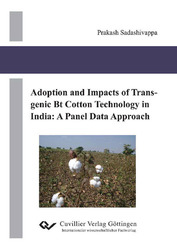| Areas | |
|---|---|
| Serie de libros (97) |
1381
|
| Nachhaltigkeit |
3
|
| Gesundheitswesen |
1
|
| Letra |
2369
|
| Ciencias Naturales |
5408
|
| Matemática | 229 |
| Informática | 319 |
| Física | 980 |
| Química | 1364 |
| Geociencias | 131 |
| Medicina humana | 243 |
| Estomatología | 10 |
| Veterinaria | 108 |
| Farmacia | 147 |
| Biología | 835 |
| Bioquímica, biología molecular, tecnología genética | 121 |
| Biofísica | 25 |
| Nutrición | 45 |
| Agricultura | 1005 |
| Silvicultura | 201 |
| Horticultura | 20 |
| Ecología y conservación de la tierra | 148 |
| Ciencias Ingeniería |
1795
|
| General |
98
|
|
Leitlinien Unfallchirurgie
5. Auflage bestellen |
|
Erweiterte Suche
Adoption and Impacts of Transgenic Bt Cotton Technology in India: A Panel Data Approach (Tienda española)
Prakash Sadashivappa (Autor)Previo
Indice, Datei (33 KB)
Lectura de prueba, Datei (68 KB)
Bacillus thuringiensis (Bt) cotton was introduced in India in 2002 and is the only genetically modified (GM) crop commercially available in
the country. The technology faced enormous arguments before and after the official introduction in the country. The author presents the sustainability of effects over time based on unique panel data set of 5 years generated from 3 waves of survey. The study extends beyond the
traditional farm level analysis by highlighting the advantages of panel data econometrics in studying technology adoption and impacts. Results suggest that Bt cotton technology is very successful in India. The technology has resulted in higher net impacts on cotton yields and
profits. Both small-and large-scale farmers in India are very satisfied with the innovation. Government interventions into pricing of transgenic
seeds and policy implications are discussed.
| ISBN-10 (Impresion) | 3869551151 |
| ISBN-13 (Impresion) | 9783869551159 |
| ISBN-13 (E-Book) | 9783736931152 |
| Idioma | Inglés |
| Numero de paginas | 184 |
| Edicion | 1 Aufl. |
| Volumen | 0 |
| Lugar de publicacion | Göttingen |
| Lugar de la disertacion | Universität Hohenheim |
| Fecha de publicacion | 07.10.2009 |
| Clasificacion simple | Tesis doctoral |
| Area |
Agricultura
|








